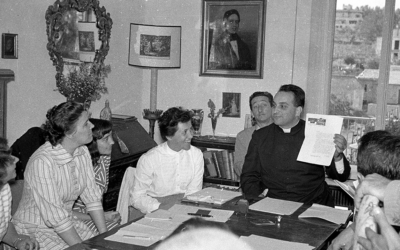On more than one occasion Luke speaks about the disciples discussing who is the greatest among them (see Lk 9:46). This time it is during the last supper. Jesus had just instituted the Eucharist, the greatest sign of his love, of his unconditional gift of self, anticipating what he would go through just a few hours later on the cross. He is there with his followers “as the one who serves” (Lk 22:27). In fact, John’s Gospel reports his concrete gesture of washing the feet of his disciples. During this month when Christians celebrate Easter, Jesus’ resurrection, it is important to keep in mind this teaching.
The disciples do not understand because they are conditioned by the common human mentality that favors prestige and honor, the highest place on the social ladder, becoming “somebody.” Jesus, however, came on earth precisely in order to create a new society, a new community, based on a different kind of logic: love.
If he who is the Lord and Master washed the feet of others (a task performed by slaves), we who want to follow him, especially if we are in positions of responsibility, are called to serve our neighbors with just as much concreteness and dedication.
«Let the greatest among you be as the youngest, and the leader as the servant»
This is one of the paradoxes of Jesus’ life. We can understand it only if we reason that the typical attitude of Christians is love, a love that leads them to put themselves in the last place, to become smaller than the other, as a father does when he plays with his child or when he helps his older son with his homework.
Vincent de Paul called the poor his “masters” and as such he loved them and served them because in them he recognized Jesus. Camillus de Lellis bent over the sick, washing their wounds and making their beds “with the same affection,” he wrote, “that a loving mother has for her only child who is ill.”
And closer to our times how can we not remember Blessed Teresa of Calcutta bending over thousands of dying people, making herself “nothing” in front of each one of them, the poorest of the poor?
“Making ourselves small” in front of others means trying to enter as deeply as possible into their minds and hearts to the point of sharing their sufferings and interests, even when these things might seem to be of little importance, even insignificant to us but for them they are their whole lives.
“Making ourselves small” before the other not because we are somehow above and the other is below us, but because our ego, if it is not held in check, is like a balloon ever ready to float up to a position of superiority over others.
«Let the greatest among you be as the youngest, and the leader as the servant»
“To live the other,” therefore, means that we cannot lead lives focused on ourselves, on our own worries, our own concerns, our own ideas, and whatever belongs to us.
We need to forget ourselves, to put ourselves aside in order to notice the other person, to make ourselves one with all our neighbors to the point of reaching them where they are at and lifting them up, to help them overcome their fears and worries, sufferings, complexes and disabilities, or simply in order to help them come out of themselves and go towards God and reach out to their brothers and sisters. By doing so we will find together the fullness of life and true happiness.
“The leader” also refers to people in government and public officials of all kinds who can choose to fulfill their responsibilities as a service of love, so as to create and safeguard the conditions that allow love to blossom: the love of a young couple who want to get married and who need a house and job; the love of those who want to study and who need schools and books; the love of those who have their own businesses and who need roads and railways, clear and reliable rules, and so on.
From the moment we get up in the morning until we go to bed at night, at home, in the office, at school and in our neighborhoods, we can always find opportunities to serve and to be grateful when we are served by others.
Let’s do everything for Jesus in our brothers and sisters, without neglecting anyone, but always taking the initiative in loving.
Let’s serve everyone! It’s only then that we are “great.”
Chiara Lubich




0 Comments